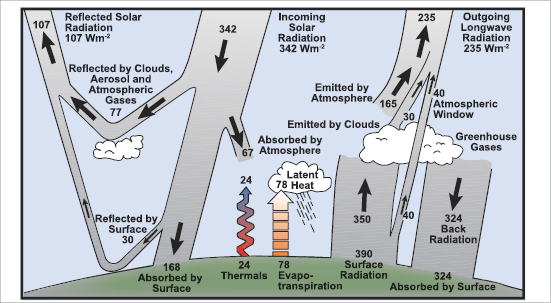The freshly baked Australian Senator Malcolm Roberts has recently phrased it thus in his maiden speech:
"It is basic. The sun warms the earth’s surface. The surface, by contact, warms the moving, circulating atmosphere. That means the atmosphere cools the surface. How then can the atmosphere warm it? It cannot. That is why their computer models are wrong."
This is of course not only questions the increasing human-caused greenhouse effect, but in general our understanding of temperatures on all planets, which goes back to Joseph Fourier, who in 1824 was the first to understand the importance of the greenhouse effect.
The atmosphere acts like a blanket which inhibits heat loss. In fact according to Roberts’ logic, a blanket could also not have a warming effect:
"It’s simple. The body warms the blanket. This means that the blanket cools the body. So how can the blanket warm it? It cannot!"
The answer is simple. The warm body loses heat to the cold air. The blanket inhibits and slows this heat loss. Therefore you stay warmer under a blanket.
The Earth loses heat to the cold universe. The atmosphere inhibits this heat loss. Therefore, the surface remains warmer than it would be without the atmosphere.
It is true that the surface loses heat to the atmosphere – but less than it would otherwise lose directly to space. Just as I lose less heat to the blanket than I would otherwise lose to the air, without blanket.
Of course, in neither case is the second law of thermodynamics violated. The heat always flows from warm to cold – just more or less effectively. The processes of heat transfer are quite different – for the blanket it is mainly heat conduction, for the greenhouse effect it is thermal radiation. The climate deniers claim that the colder atmosphere cannot radiate thermal radiation towards the warmer surface. This is of course nonsense. The cool Earth also sends thermal radiation towards the hot sun – how would thermal radiation leaving Earth know how warm the surface is that it’s going to hit? It’s just that the sun sends more radiation back to us – the net flow is from hot to cold. More is not implied by the second law of thermodynamics.
Thanks to two Germans (Gerlich and Tscheuschner of the TU Braunscheig – deeply embarrassing for this university), the absurd claim that the greenhouse effect violates the second law of thermodynamics even made it into an obscure physics journal – obviously there was no peer review to speak of. The bizarre article was promptly demolished by some US physicists. Just recently I read the claim again in an article of coal lobbyist Lars Schernikau – with such fairy-tale beliefs of its representatives, one is not surprised by the decline of the coal industry.
The thermal radiation from the atmosphere toward the ground, which allegedly cannot exist, is of course routinely measured, including its increase (see e.g. Philipona et al. 2004, 2012).
And you can even feel it. Those who sometimes sit outside in the garden after dark know this. Under a dense, low cloud layer you do not nearly get cold as fast as on a clear starry night. This is due to the thermal radiation coming from the clouds. They are colder than our body, but warmer than the night sky in clear air.
Roberts said: “Like Socrates, I love asking questions to get to the truth.” Perhaps he will ponder my answer next time he sits in his garden at night, or slips under a blanket.

Here is the energy balance diagram for our Earth, explained in IPCC FAQ 1.1. The “Back Radiation” makes the greenhouse effect. It is larger than the solar radiation reaching the ground, and measured by a global radiation measurement network.
Page 1 of 2 | Next page
Nenhum comentário:
Postar um comentário